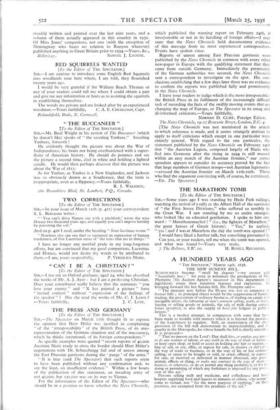A HUNDRED YEARS AGO
" THE SPECTATOR," MARCH 24th, 1838.
THE NEW SUNDAY BILL.
SUNDAY-BILLS become " small by degrees "—we cannot add " beautifully less ; " for even in miniature the productions of Mr. Plumptre (Sir Andrew Agnew's successor in this department of legislation) retain their repulsive features and expression. In bringing forward the last Sunday-bill, Mr. Plumptre said-
" The measure now before the House was not so extensive as
former bills ; its principal object would be the suppression of Sunday trading, the prevention of ordinary busine ss, of trading on canals and navigable rivers, the labouring at men's common calling, work, or trade, buying or selling goods or animals, the sale of milk during certain hours excepted, as also the supply of bond fide lodgers in public- houses."
This is a modest attempt, in comparison with some that bay.,.
been made to meddle with matters which it is beyond the province of the Legislature to regulate. Still, an examination of the chi provision of the bill will demonstrate its impracticability, and :- cruelty in the Metropolis, for whose benefit the bill is chiefly intends It is proposed-
" That no person on the Lord's Day shall hire, cr employ any pas, to do any manner of labour, or any work in the way of trade or businc, or keep open shop, or hold or assist in holding any fair or market, buy or sell, or cry, offer, or expose for sale, or receive or detv:r the way of trade or business, or in the way of his or her ordinal- calling, or cause to be bought or sold, or cried, offered, or expose.: for sale, or received or delivered in manner aforesaid, any good . animal, effects or thing, or make any contract in the way of trcdc • business, or otherwise, or do or permit any thing prohibited, or fcr th doing or permitting of which any forfeiture is imposed by any prov.- sion of this act." Persons selling milk and medicine, and coffeehouse and hot::: keepers supplying food and liquors to inmates or others, who actual'" come to • victual, not " for the mere purpose of tippling," on 'the:: premises, are exempted from the penalties of the act. '










































































 Previous page
Previous page